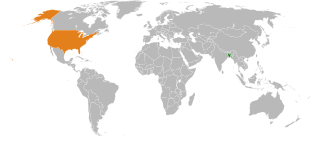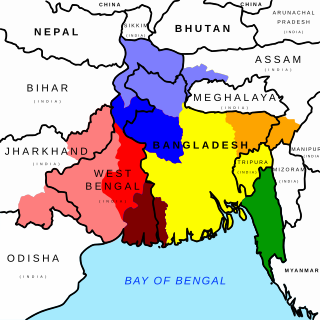
Bangladesh, officially the People's Republic of Bangladesh, is a country in South Asia. It is the eighth-most populous country in the world and is among the most densely populated countries with a population of nearly 170 million in an area of 148,460 square kilometres (57,320 sq mi). Bangladesh shares land borders with India to the north, west, and east, and Myanmar to the southeast. To the south, it has a coastline along the Bay of Bengal. It is narrowly separated from Bhutan and Nepal by the Siliguri Corridor, and from China by the mountainous Indian state of Sikkim in the north. Dhaka, the capital and largest city, is the nation's political, financial, and cultural centre. Chittagong is the second-largest city and is the busiest port on the Bay of Bengal. The official language of Bangladesh is Bengali while Bangladeshi English is also used in the government and official documents alongside Bengali.

Dhaka, formerly known as Dacca, is the capital and largest city of Bangladesh. It is the ninth-largest and seventh-most densely populated city in the world. Dhaka is a megacity, and has a population of 10.2 million residents as of 2022, and a population of over 22.4 million residents in Dhaka Metropolitan Area. It is widely considered to be the most densely populated built-up urban area in the world. Dhaka is the most important cultural, economic, and scientific hub of Eastern South Asia, as well as a major Muslim-majority city. Dhaka ranks third in South Asia and 39th in the world in terms of GDP. Lying on the Ganges Delta, it is bounded by the Buriganga, Turag, Dhaleshwari and Shitalakshya rivers. Dhaka is also the largest Bengali-speaking city in the world.

The economy of Bangladesh is a major developing market economy. As the second-largest economy in South Asia, Bangladesh's economy is the 35th largest in the world in nominal terms, and 25th largest by purchasing power parity. Bangladesh is seen by various financial institutions as one of the Next Eleven. It has been transitioning from being a frontier market into an emerging market. Bangladesh is a member of the South Asian Free Trade Area and the World Trade Organization. In fiscal year 2021–2022, Bangladesh registered a GDP growth rate of 7.2% after the global pandemic. Bangladesh is one of the fastest growing economies in the world.

The Bangladesh Armed Forces are the military forces of the People's Republic of Bangladesh. They consist of the three uniformed military services: the Bangladesh Army, the Bangladesh Navy and the Bangladesh Air Force. The Armed Forces are under the jurisdiction of Ministry of Defence of the Government of Bangladesh, and are directly administered by the Armed Forces Division of the Prime Minister's Office. The President of Bangladesh serves as the Commander-in-Chief of the Bangladesh Armed Forces. Bangladesh has the third-largest defence budget in South Asia, The Bangladeshi military is the 37th strongest in the world and the third most powerful military force in South Asia. Border Guard Bangladesh and Bangladesh Coast Guard are under the jurisdiction of the Ministry of Home Affairs. during peacetime, but during wartime they fall under the command of Bangladesh Army and Bangladesh Navy respectively.

Muhammad Yunus is a Bangladeshi social entrepreneur, banker, economist and civil society leader who was awarded the Nobel Peace Prize in 2006 for founding the Grameen Bank and pioneering the concepts of microcredit and microfinance. These loans are given to entrepreneurs that are too poor to qualify for traditional bank loans. Yunus and the Grameen Bank were jointly awarded the Nobel Peace Prize "for their efforts through microcredit to create economic and social development from below". The Norwegian Nobel Committee said that "lasting peace cannot be achieved unless large population groups find ways in which to break out of poverty" and that "across cultures and civilizations, Yunus and Grameen Bank have shown that even the poorest of the poor can work to bring about their own development". Yunus has received several other national and international honours. He received the United States Presidential Medal of Freedom in 2009 and the Congressional Gold Medal in 2010.

Sylhet is a metropolitan city located in the northeastern region of Bangladesh. It is the administrative center of Sylhet Division and is situated on the banks of the Surma River. Sylhet is the fifth-largest city in Bangladesh, with a population of around 700,000 people.

The Directorate General of Forces Intelligence, commonly known by its acronym DGFI, is the defense intelligence agency of the Bangladesh Armed Forces, tasked with collection, collation and evaluation of strategic and topographic information, primarily through human intelligence (HUMINT). As one of the principal members of the Bangladesh intelligence community, the DGFI reports to the Director-General under the executive authority of the head of government, the Prime Minister, and is primarily focused on providing intelligence for the Prime Minister, the Cabinet of Bangladesh, and the Armed Forces of Bangladesh.

Grameenphone, widely abbreviated as (d/b/a) GP, is a telecommunications service provider in Bangladesh. As of December 2023, its subscribers span over 82.20 million. It is a joint venture between Telenor and Grameen Telecom. Where Telenor owns a 55.8% share of Grameenphone, Grameen Telecom owns 34.2% and the remaining 10% is publicly held.

Banglalink Digital Communications Ltd., d.b.a. Banglalink is a Bangladeshi telecommunications company headquartered in Dhaka. It is the third-largest mobile network operator in Bangladesh and a subsidiary of VEON.

Shahbagh is a major neighbourhood and a police precinct or thana in Dhaka, the capital and largest city of Bangladesh. It is also a major public transport hub. It is a junction between two contrasting sections of the city—Old Dhaka and New Dhaka—which lie, respectively, to its south and north. Developed in the 17th century during Mughal rule in Bengal, when Old Dhaka was the provincial capital and a centre of the flourishing muslin industry, it came to neglect and decay in early 19th century. In the mid-19th century, the Shahbagh area was developed as New Dhaka became a provincial centre of the British Raj, ending a century of decline brought on by the passing of Mughal rule.
Desh TV, stylized as DESHTV, is a Bangladeshi Bengali-language satellite and cable television channel owned by Desh Television Limited, a part of the Karnaphuli Group conglomerate. It officially commenced broadcasts on 26 March 2009. Desh TV is headquartered in Malibagh, Dhaka. The channel is broadcast via the Bangabandhu-1 satellite.

Bangladesh-United States relations are the bilateral relations between Bangladesh and the United States of America. For the United States, Bangladesh is the 38th largest goods supplier and 60th largest export market. For Bangladesh, the United States is the largest export market. The two countries signed a bilateral investment treaty in 1986. U.S. companies are the largest foreign investors in Bangladesh. The U.S. government is the leading contributor of humanitarian assistance in response to the Rohingya crisis. Both nations have announced similar views for a Free and Open Indo-Pacific.

The Bangladesh Police is the national law enforcement agency of Bangladesh, operating under the Ministry of Home Affairs. It plays a crucial role in maintaining peace, and enforcement of law and order within Bangladesh. Though the police are primarily concerned with the maintenance of law and order and security of persons and property of individuals, they also play a big role in the criminal justice system. Bangladesh Police played an important role during the Bangladesh Liberation War.

Mohammed Zillur Rahman was a Bangladeshi politician who served as the President from 2009 to his death in 2013. He was also a senior presidium member of the Awami League. He is the third president of Bangladesh, after Sheikh Mujibur Rahman and Ziaur Rahman, to die in office, while being the first to die of natural causes.

The Bangladeshi diaspora are people of Bangladeshi birth, descent or origin who live outside of Bangladesh. First-generation migrants may have moved abroad from Bangladesh for various reasons including better living conditions, to escape poverty, to support their financial condition, or to send money back to families there. The Ministry of Expatriates' Welfare and Overseas Employment estimates there are almost 7.5 million Bangladeshis living abroad, the fourth highest among the top 176 countries of origin for international migrants. Annual remittances transferred to Bangladesh were almost $23 billion in 2023, the seventh highest in the world and the third highest in South Asia.

Cyclonic Storm Bijli, was the first tropical cyclone to form during the 2009 North Indian Ocean cyclone season. Bijli formed from an area of Low Pressure on April 14. Later that evening, RSMC New Delhi upgraded the low-pressure area to a Depression and designated it as BOB 01. The Joint Typhoon Warning Center (JTWC) then issued a Tropical Cyclone Formation Alert for the system and soon after designated it as Tropical Depression 01B. On the evening of April 15, both RSMC New Delhi and the JTWC reported that the system had intensified into a tropical storm, with the former naming it Bilji. Soon after, Bilji reached its peak intensity as it approached the coast of Bangladesh. However, on the morning of April 17, Bijli weakened to a deep depression due to land interaction, before making landfall just south of Chittagong. The remnants of Bilji continued to weaken as they tracked across northern Myanmar, before RSMC New Delhi issued their last advisory on April 18. The word Bijli refers to lightning in Hindi.

Bangladeshis are the citizens of Bangladesh, a South Asian country centred on the transnational historical region of Bengal along the eponymous bay.

On 5 February 2013, protests ignited in Shahbagh, Bangladesh, fueled by the call for the execution of the convicted war criminal Abdul Quader Mollah. Previously sentenced to life imprisonment, Mollah was convicted on five of six counts of war crimes by the International Crimes Tribunal of Bangladesh. Mollah supported the West Pakistan during the 1971 Bangladesh Liberation War and played a crucial role in the murder of numerous Bengali nationalists and intellectuals. The demonstrations also sought the government's ban on the radical right-wing and conservative-Islamist group, Jamaat-e-Islami from participating in politics, including elections, and a boycott of institutions supporting or affiliated with the group.
The information technology sector in Bangladesh had its beginnings in nuclear research during the 1960s. Over the next few decades, computer use increased at large Bangladeshi organizations, mostly with IBM mainframe computers. However, the sector only started to get substantial attention during the 1990s. Today the sector is still in a nascent stage, though it is showing potential for advancement. Nonetheless, Bangladesh IT/ITES industry has fared comparatively well by achieving US$1.3 billion export earnings in FY 2020-21 and holding US$1.4 billion equivalent market share in the local market contributing 0.76 per cent to the GDP creating more than 1 million employment opportunities so far amid Covid-19 havoc that suddenly shattered businesses last year. Consequentially, riding on the successes of IT/ITES sector-supported export-led industries as well as pro-private sector and conducive policies pursued by Bangladesh Government, the country is now poised to become a Developing Country by 2026, as recommended by the United Nations Committee for Development Policy (UNCDP), besides, Bangladesh now seeks to transform itself into a knowledge-based and 4IR-driven cashless economy, aiming to become a developed country by 2041. The Bangladesh government has formulated a draft 'Made in Bangladesh– ICT Industry Strategy' aimed at turning Bangladesh into an ICT manufacturing hub, enhancing export of local products, attracting foreign investment and creating employment proposing to implement in three

Enforced disappearances in Bangladesh are cases in which the Government of Bangladesh directly or indirectly kidnaps people and holds them incommunicado. According to a Dhaka-based human rights group Odhikar, at least 402 people have become victim of enforced disappearance from 2009 to 2017 under the current Awami League administration. These incidents along with extrajudicial killings in Bangladesh has been criticized by The United Nations and human rights groups including Human Rights Watch and Amnesty International. Rapid Action Battalion (RAB), a special paramilitary unit in Bangladesh, is alleged to be behind most of these disappearances even though RAB claimed these allegations to be false. The current Awami League government denies involvement in these forced disappearances even when victims later surface in custody.
















